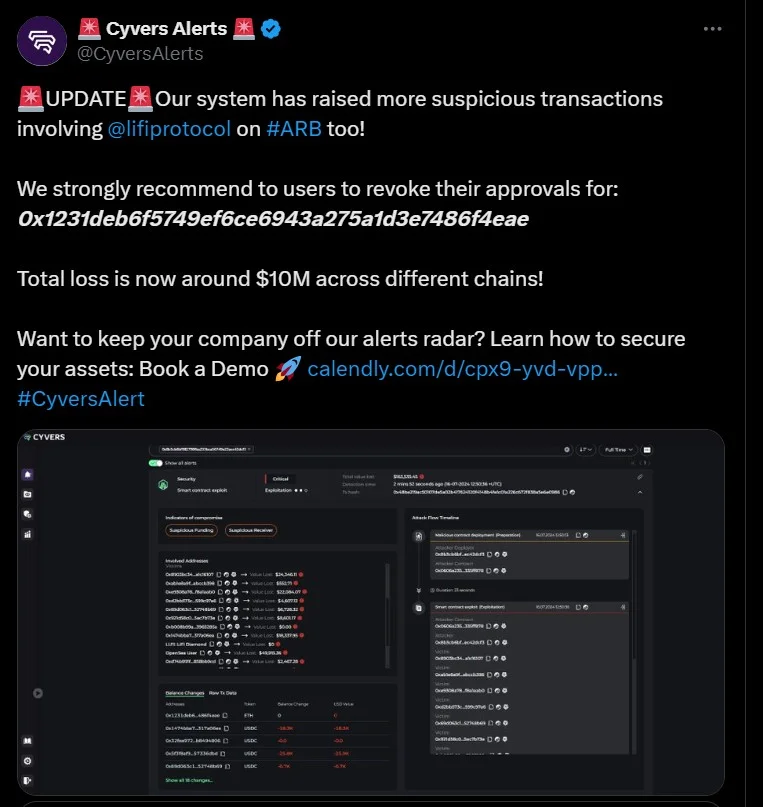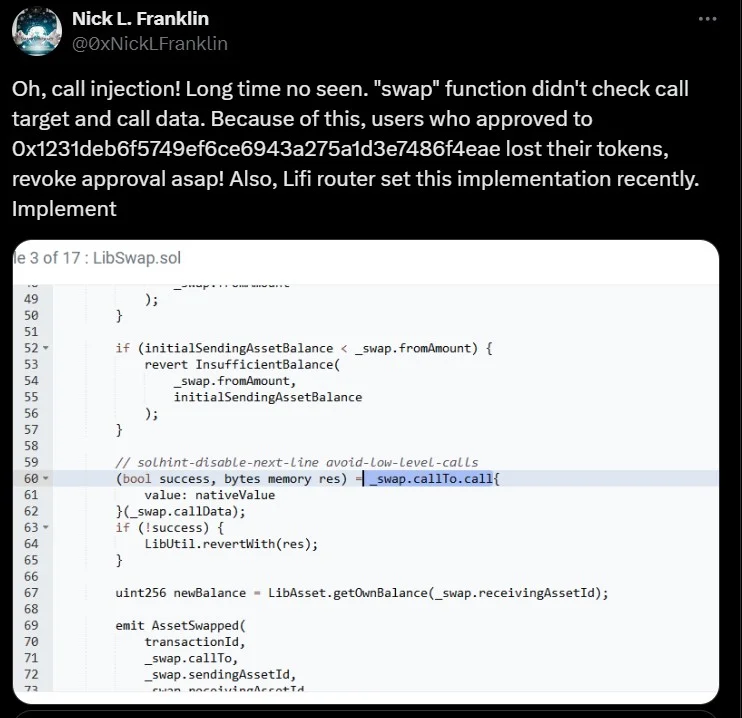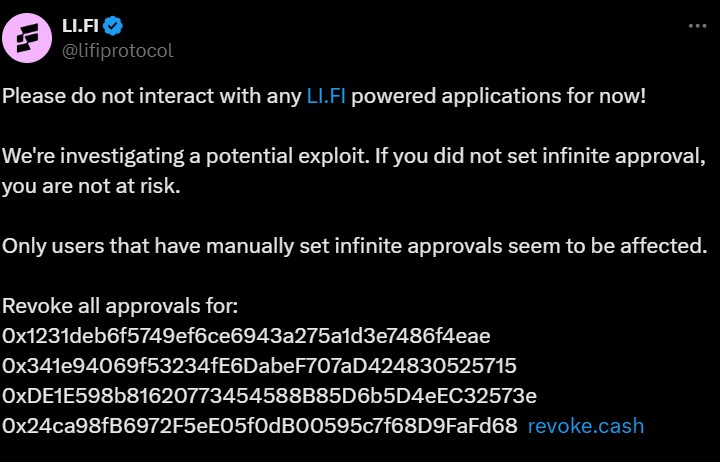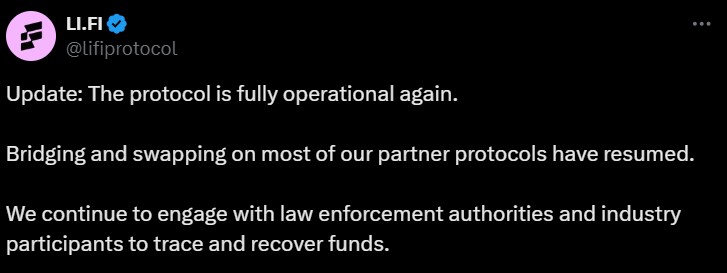Li.Fi Hacked Again: DeFi Users Lose $10 Million

Hackers leveraged a vulnerability to drain nearly $10 million worth of cryptocurrency from unsuspecting users' wallets.
Krishna Murthy July 17, 2024

Share on LinkedInShare on Twitter
Just two years after patching a similar exploit, cross-chain Decentralized Finance (DeFi) protocol Li.Fi has been hit again by hackers, this time losing nearly $10 million in cryptocurrency. The Li.Fi attack, which took place on July 16, 2024, targeted a vulnerability in Li.Fi’s contract, allowing attackers to drain funds from unsuspecting users’ wallets.
This isn’t the first time Li.Fi has faced security issues. Back in March 2022, the protocol fell victim to a similar exploit, raising concerns about the robustness of its security measures. The recent attack highlights the ongoing challenges faced by DeFi protocols in securing user funds and the importance of staying vigilant in a rapidly evolving threat landscape.


Source: X
Understanding the Attack: How Hackers Exploited Li.Fi
According to a post on X by a user named Nick L. Franklin, the attack leveraged a vulnerability known as a “call injection.” This vulnerability arises when a function within a smart contract doesn’t properly validate user input.


Source: X
In the case of Li.Fi, attackers were able to inject a malicious function call that essentially tricked the contract into transferring users’ funds to a hacker-controlled address.
The Li.Fi team identified a specific contract address (0x1231deb6f5749ef6ce6943a275a1d3e7486f4eae) used by the attackers and urged users to revoke approvals for this address to prevent further loss. The team also provided a list of additional addresses to revoke for those who had manually set infinite approvals:
- 0x341e94069f53234fE6DabeF707aD424830525715
- 0xDE1E598b81620773454588B85D6b5D4eEC32573e
- 0x24ca98fB6972F5eE05f0dB00595c7f68D9FaFd68
This essentially revokes the permission granted by users to Li.Fi to access their funds.


Source: X
While the exact details of the exploit haven’t been fully disclosed, comments on social media suggests that the bad actors targeted users who had previously granted Li.Fi “infinite approval” for their tokens. This essentially gives the protocol unlimited access to a user’s funds, a practice generally discouraged due to the inherent security risks.
Impact of the Attack: Millions Lost and DeFi’s Reputation Tarnished
The attack resulted in the loss of nearly $10 million worth of cryptocurrency across various chains, including Ethereum (ETH), USD Coin (USDC), and Tether (USDT). While the exact number of affected users remains unclear, the incident has undoubtedly shaken confidence in Li.Fi and the broader DeFi ecosystem.
This latest exploit comes at a critical time for DeFi, which is already grappling with regulatory uncertainty and concerns about its overall security. The incident underscores the need for stricter development practices, rigorous audits, and a more proactive approach to security from DeFi protocols.
Lessons Learned: How to Stay Safe in the DeFi Space
The Li.Fi hack serves as a stark reminder of the inherent risks associated with DeFi. Here are some key takeaways for users:
- Be Wary of Infinite Approvals: Avoid granting DeFi protocols “infinite approval” for your tokens. Opt for more granular permissions whenever possible.
- Research Before You Invest: Always conduct thorough research on any DeFi protocol before investing your funds. Look for projects with a proven track record, strong security audits, and a transparent development team.
- Stay Updated: Keep yourself informed about the latest security threats and vulnerabilities in the DeFi space.
What’s Next for Li.Fi?
The Li.Fi team is currently investigating the attack and working to implement security measures to prevent similar incidents in the future. They have advised users to revoke approvals for the malicious contract address and refrain from interacting with Li.Fi powered applications until further notice. In a post on X on July 17, Li.Fi wrote that the protocol was fully operational again.


Source: X
The future of Li.Fi remains uncertain. Rebuilding user trust will be a significant challenge, and the protocol will likely face heightened scrutiny from regulators and security experts. Whether Li.Fi can recover from this setback depends on its ability to demonstrably improve its security posture and regain the confidence of the DeFi community.
The Evolving Threat Landscape in DeFi
The Li.Fi hack is a stark reminder that DeFi protocols are prime targets for cybercriminals. As the value locked in DeFi continues to grow, so too will the sophistication of attacks.
DeFi developers need to prioritize security by employing rigorous code audits, implementing best practices, and working with security researchers to identify and address potential vulnerabilities. Users, on the other hand, need to exercise caution, conduct thorough research, and understand the inherent risks involved before investing in DeFi protocols.
The Li.Fi incident serves as a wake-up call for the entire DeFi ecosystem. Only through a collaborative effort that prioritizes security and user protection can DeFi mature into a truly viable and trustworthy financial alternative.





